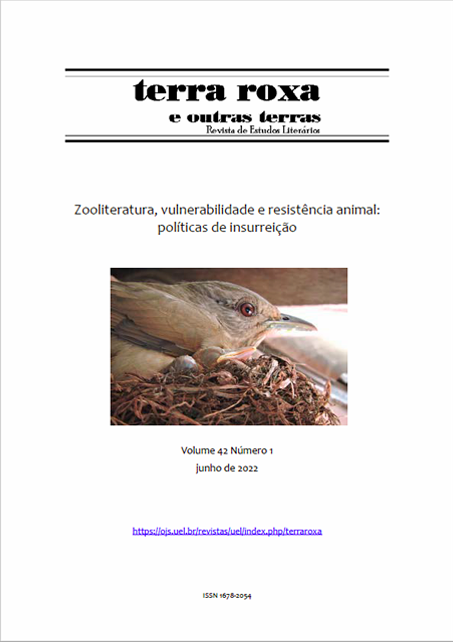The experience of animality in "A maçã no escuro", by Clarice Lispector, and in "Acenos e afagos", by João Gilberto Noll: a comparative study
DOI:
https://doi.org/10.5433/1678-2054.2022v42p83-95Keywords:
A maçã no escuro, Acenos e afagos; animality, animalityAbstract
This article aims to analyze the experience of characters with animality in A maçã no escuro (1961), by Clarice Lispector (1920-1977), and Acenos e afagos (2008), by João Gilberto Noll (1946-2017). In this approach, we will discuss animals' experiences calling for the disqualification and disorganization of subjects. For this, the formless and the "unclean" emerge as a more particular way of showing contact between the man and the savage. We are, therefore, in the field of the disarticulation of any order in the face of Inhumans - animals. For this article, we use discussions by Nascimento (2012), Giorgi (2016), Berger (2021), Nor (2018), Maciel (2016), Sousa (2012), Seligmann-Silva (2011), Garramuño (2011), Agamben (2017), Bataille (2008), Yelin (2015), and Deleuze & Guattari (1980).
Downloads
References
AGAMBEN, Giorgio. O aberto: o homem e o animal. Trad. Pedro Barbosa Mendes. 2. ed. Rio de Janeiro: Civilização Brasileira, 2017.
BATAILLE, Georges. Documents. Trad. João Camilo Penna e Marcelo Jacques de Moraes. Florianópolis: Cultura e Barbárie, 2018.
BERGER, John. Por que olhar para os animais? Trad. Pedro Paulo Pimenta. São Paulo: Fósforo, 2021.
BRAVO, Álvaro Fernández. Desenjaular o animal humano. Trad. Maria Esther Maciel. Maria Esther Maciel, org. Pensar/ escrever o animal: ensaios de zoopoética e biopolítica. Florianópolis: Ed. UFSC, 2011. p. 221-243.
DELEUZE, Gilles, & Félix Guattari. Mille plateaux: capitalisme et schizophrénie. Paris: Éditions de Minuit, 1980.
GARRAMUÑO, Florencia. Região compartilhada: dobras do animal-humano. Trad. Maria Esther Maciel. Maria Esther Maciel, org. Pensar/ escrever o animal: ensaios de zoopoética e biopolítica. Florianópolis: Ed. UFSC, 2011. p. 105-116.
GIORGI, Gabriel. Formas comuns: animalidade, literatura, biopolítica. Trad. Carlos Nougué. Rio de Janeiro: Rocco, 2016.
LISPECTOR, Clarice. A maçã no escuro. Rio de Janeiro: Francisco Alves, 1961.
MACIEL, Maria Esther. Literatura e a animalidade. Rio de Janeiro: Civilização brasileira, 2016.
NASCIMENTO, Evando. Clarice Lispector: uma literatura pensante. Rio de Janeiro: Civilização Brasileira, 2012.
NUNES, Benedito. O mundo de Clarice Lispector (ensaio). Manaus: Edições Governo do Estado do Amazonas, 1966.
NOOL, João Gilberto. Acenos e afagos. Rio de Janeiro: Record, 2008.
NOR, Gabriela Ruggiero. Narrativa e indeterminação: uma leitura de Acenos e afagos, de João Gilberto Noll. Tese (Doutorado em Literatura Brasileira) - Universidade de São Paulo, 2018. Disponível em: https://www.teses.usp.br/teses/disponiveis/8/8149/tde-29072019-145738/pt-br.php.
SELIGMANN-SILVA, Márcio. Mal-estar na cultura: corpo e animalidade em Kafka, Freud e Coetzee. Maria Esther Maciel, org. Pensar/ escrever o animal: ensaios de zoopoética e biopolítica. Florianópolis: Ed. UFSC, 2011. p. 149-167.
SOUSA, Carlos Mendes de. Clarice Lispector: figuras da escrita. São Paulo: Instituto Moreira Salles, 2012.
YELIN, Julieta. Viajes a ninguna parte. Sobre la representación de la animalidad en "Meu tio o iauaretê" de João Guimarães Rosa y A paixão segundo G.H. de Clarice Lispector. La letra salvaje: ensayos sobre literatura y animalidad. Rosario: Beatriz Viterbo, 2015. p. 135-149.
Downloads
Published
How to Cite
Issue
Section
License
Copyright (c) 2022 Terra Roxa e Outras Terras: Revista de Estudos Literários

This work is licensed under a Creative Commons Attribution-NonCommercial 4.0 International License.
Authors who publish in this journal agree to the following terms:
a) The authors retain the copyright and grant the journal the right of first publication, the work being simultaneously licensed under the Creative Commons Attribution-NonCommercial 4.0 International License, allowing the sharing of the work with acknowledgment of the authorship of the work and initial publication in this journal.
b) Authors are authorized to assume additional contracts separately, for non-exclusive distribution of the version of the work published in this journal (eg, publish in an institutional repository or as a book chapter), with acknowledgment of authorship and initial publication in this journal.
c) Authors are allowed and encouraged to publish and distribute their work online (e.g. in institutional repositories or on their personal page) after the editorial process, as this can generate productive changes as well as increase impact and citation of the published work (See The Effect of Open Access).
d) The authors of the approved works authorize the journal to, after publication, transfer their content for reproduction in content indexers, virtual libraries and the like.
e) The authors assume that the texts submitted for publication are of their original creation, taking full responsibility for their content in case of any objection by third parties.




















